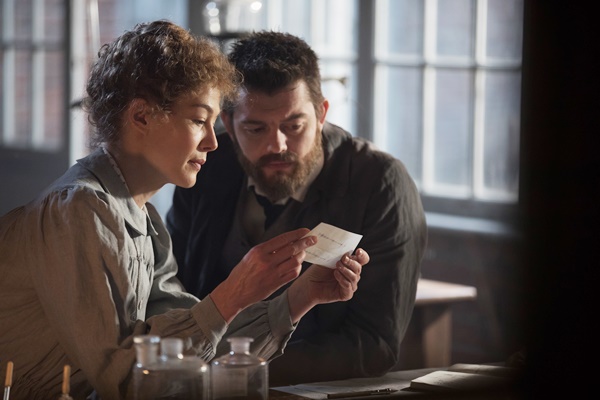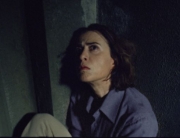
If anyone deserves an Oscar-bait biopic, it’s Marie Curie, discoverer of radium and polonium, the first female professor at the Sorbonne, and the only woman to have won two Nobel Prizes. Radioactive, the new film by Marjane Satrapi (Persepolis, The Voices), though lovely to look at and filled with solid performances, isn’t quite that film.
The problem lies mainly with the exposition-heavy script by Jack Thorne. When it follows the typical biopic tropes, it follows them to the letter. When it deviates, the tone deviates so drastically that it jars.
Rosamund Pike presents a steely, persistent front that rarely cracks. Sam Riley matches her as her husband, the more affable Pierre Curie, also a brilliant scientist in his own right, though as Marie reminds him in a particularly volatile argument, “You have a fine mind. Mine is finer.” But beyond those two, there are no fully drawn portrayals. Everyone and everything else feels like archetypes or stereotypes. So great actors like Simon Russell Beale and Aneurin Barnard have quite a bit of filling in to do to create three-dimensional characters. They mostly succeed.
The film’s structure follows the hoariest of biography clichés. The film starts with an elderly Marie in 1934 collapsing and being rushed to the hospital. As she’s wheeled through the hospital halls, we are privy to the circumstances of her life as she reflects back. These are mostly told in chronological order, except for flashbacks that explain certain aspects of her behavior (her fear of hospitals). As it is, they interrupt the narrative flow more than convey a depth of character.
Time-traveling vignettes are peppered throughout, pointing out the future benefits and drawbacks of the Curies’ discovery of radioactivity. So, we get a bit about a boy possibly having his cancer cured in 1957 Cleveland, a look inside the 1986 Chernobyl disaster, and in the most egregious example, the 1945 bombing of Hiroshima from an on-the-ground perspective. There is no real reason for these didactic discursions except to further underline the historical ramifications of the Curies’ discoveries. More importantly, they completely take viewers out of the film rather than enhance it.
Yet Radioactive succeeds in generating an excitement for scientific discovery and acknowledging the drudgery and frustration that come along with it. The scenes in the lab, depicting just how the Curies had to mortar and pestle hundreds of pounds of material to obtain the tiniest sliver of radium, crackle and are impressive. In the first half, the movie also offers a clear and tender view on the marriage of Marie and Pierre, two brilliant collaborative scientists who are trying to balance egos, marriage, children, and careers. This is the centerpiece, and the actors are wonderful. Once Pierre is out of the picture, the film becomes instantly mundane and rudderless.
Everything looks good though. Cinematographer Anthony Dod Mantle and production designer Michael Carlin create a Paris that seems cool blue and wet with precipitation at night and bright and full of dust motes catching the sun during the day. However, Satrapi’s direction moves in fits and starts; she couldn’t quite corral Thorpe’s choppy script into something fluid and consistently compelling.
Overall, a disappointing miss.
















Leave A Comment